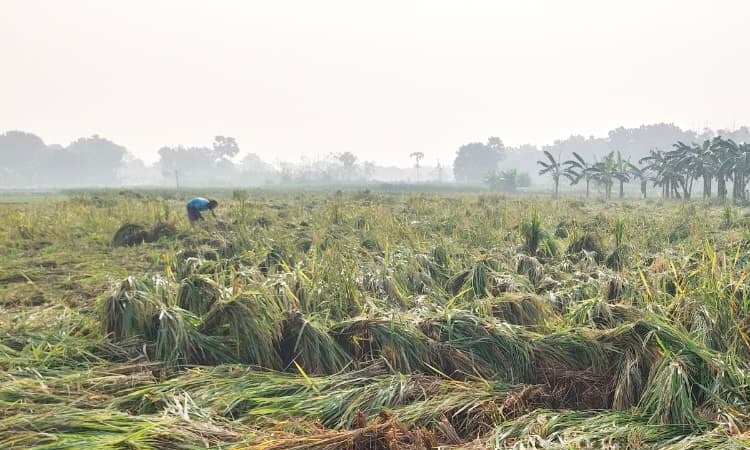News Flash
News Flash

By Md Aynal Haque
RAJSHAHI, Nov 7, 2025 (BSS) – Untimely heavy rainfall has caused devastating damage to various standing crops worth around Taka 10.27 crore in the district.
According to the Department of Agricultural Extension (DAE), standing crops on 2,150 bighas of land were damaged by the rainfall on November 1 and 2, affecting 4,200 farmers.
Talking to BSS here on Thursday, DAE Deputy Director Nasir Uddin said vegetables worth Taka 2.67 crore, transplanted Aman worth Taka 1.16 crore, onion worth Taka 1.27 crore, and mustard worth Taka 1.85 crore were badly affected due to the deluge.
He said 64 millimeters of rainfall were recorded over the two days. Many mud-made houses also collapsed due to the rainfall.
Like many other parts of the district, vast tracts of cropland in Paba, Mohanpur, Durgapur, Tanore, and Godagari upazilas were submerged and still remain waterlogged.
“We have cultivated BRRI-87 variety Aman paddy on one bigha of land, and it was affected by the natural calamity just before harvesting,” said Abdur Razzaque, a farmer of Paikpara village under Paba upazila.
Farmers Sajjad, Mojahar, and Tajibur Rahman said, “The amount of rain we experienced this time was like what we usually see in the months of Boishakh and Joishtho (April–May). Experiencing this in mid-Kartik (November) is truly surprising.”
Another farmer, Halim Reza, said, “I have never seen such heavy rain during the winter season before. This is the first time in my life.”
He explained that waterlogging has worsened because rivers, canals, and ponds have become silted up and filled, leaving no space for excess water to drain.
This year’s Aman paddy, along with cauliflower, cabbage, bottle gourd, and radish crops, had grown well. Farmers who were disappointed by low potato prices had pinned their hopes on these crops to recover their losses. Sadly, those hopes have now been dashed.
Borgachi saw extensive cauliflower cultivation. However, heavy rain severely damaged the cauliflower fields as well.
Farmer Shimul Hossain said that he had to cut new drainage channels with a spade and rent a water pump to remove excess water from his field.
He said, “This has increased my expenses even more,” describing the farmers’ situation as unbearable.
The heavy rainfall has caused extensive damage to Aman paddy and vegetables in various wetlands of Borgachi Union of Paba in Rajshahi. Due to waterlogging, most of the paddy fields have been submerged, and the crops have flattened underwater.
Farmers said they were hoping to recover from their earlier financial losses caused by the low price of potatoes through Aman paddy and winter vegetables. Unfortunately, the untimely heavy rain has shattered their hopes, causing further damage instead.
Many fear that a large portion of the paddy will rot, and straw yields will also decrease, resulting in an overall reduction in production this year.
To minimize the damage, farmers are taking immediate adaptive measures. Some are tying together five to six bundles of paddy to help the plants stand upright, while others are cutting the ridges of their fields to drain out stagnant water.
DASCOH Foundation, as part of the implementation of its project titled “Environmental Human Rights for a Just Transition: Strengthened Local CSOs Transforming Climate Hotspots into Resilient Communities (ENGAGE)”, has distributed food items among some of the affected people.
Each of the 81 farmers was given eight kilograms of rice, two kilograms of pulses, three kilograms of potatoes, one liter of edible oil, and one kilogram of salt in Panchandar, Rishikul, Saranjai, and Dewpara areas of the district to mitigate their sufferings.
The project is being implemented in Tanore and Godagari upazilas in Rajshahi district, and in Manda and Mohadevpur upazilas in Naogaon district, with the main thrust of raising awareness among communities and public authorities and sensitizing them.
With the intervention of the project, Jahangir Alam Khan said at least 75,630 of the most vulnerable people will benefit in terms of capacity building, rapid support, and advocacy to protect their rights and entitlements.
As a whole, the project is intended for the inclusive and equitable participation and empowerment of the targeted people through capacity building.